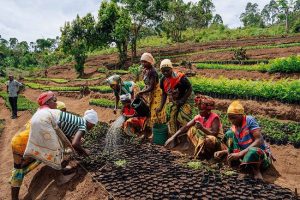A new report from the UN Climate Change secretariat reveals that 85 percent of Parties referenced gender in their latest reports and communications submitted to the United Nations Framework Convention on Climate Change (UNFCCC), including in their national climate plans, known as Nationally Determined Contributions (NDCs), their National Adaptation Plans (NAPs), and their Long-Term Low Emission Strategies (LT-LEDS).

Since the adoption of the first UNFCCC Lima Work Programme on gender (LWPG) in 2014, and of the enhanced LWPG in 2019, gender integration in all reports and communications, including NDCs, has been increasing in quantity and quality.
“Combining bold climate action with progress in gender equality is one of the most effective strategies to break away from business-as-usual scenarios and drive transformative change,” said Simon Stiell, the Executive Secretary of UN Climate Change.
The new UN Climate Change report, Implementation of Gender-Responsive Climate Policies, Plans, Strategies, and Actions, shows 81.5 percent of NDCs include references to gender – a significant improvement on when Parties first communicated their intended NDCs in 2015, of which only a few included references to gender, according to analysis by the Women’s Environment & Development Organisation (WEDO).
However, further efforts are required to strengthen gender integration in Parties’ climate action and adaptation plans. The new report notes that current gender references primarily focus on women, especially in the context of vulnerability, with very few references considering men who may be in vulnerable situations, nor a comprehensive view of gender that considers how different factors like race, class, or ability intersect with gender in exacerbating vulnerability.
Furthermore, while developing countries and Least Developed Countries (LDCs) have been consistently integrating gender into their regular reporting under the UNFCCC, developed countries often provide limited or no references to gender, particularly in National Communications and LT-LEDS.
The report indicates that gender-responsive approaches are viewed by many as a way to boost the ambition and effectiveness of climate action. Most Parties reaffirmed their commitment to advancing gender equality as a critical component of this work.
This was reflected in the outcomes of the first Global Stocktake agreed at COP28, which encouraged Parties to implement climate policy and action that is gender-responsive. The next round of Nationally Determined Contributions (NDCs 3.0), which Parties are currently preparing and submitting in 2025, will serve as a critical opportunity to strengthen interconnected action to achieve gender equality and effective climate outcomes.
COP29: deciding the future of the work on gender and climate change
The review of the enhanced Lima work programme on gender and its gender action plan (GAP) is an opportunity for Parties to shape how the outcomes of the Global Stocktake, mentioned above, are implemented. The review was initiated at the 2024 UN June Meetings and are expected to conclude during COP29, in Baku, Azerbaijan.
“Parties have a significant opportunity to shape a more just and ambitious future as they develop the next work programme and action plan,” said Nabeel Munir, Chair of the UN Climate Change Subsidiary Body for Implementation (SBI).
At the UN June Meetings (SB60), Parties and observers discussed progress, challenges, gaps, and priorities in implementing the enhanced Lima Work Programme on Gender and its gender action plan.
A 2.5-day workshop provided a dynamic platform for regional and global discussions on enhancing the implementation of gender-responsive climate policies and actions. Discussions also explored linkages with processes both within and outside the UNFCCC, key stakeholders, and future priorities for gender and climate change work.
